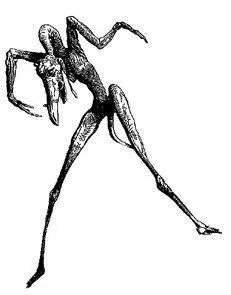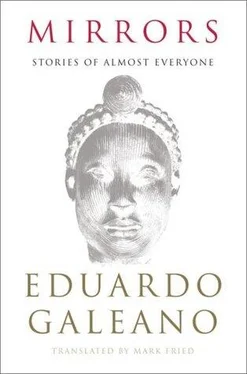About a quarter of a million Germans were sterilized between 1935 and 1939.
Then came extermination.
The deformed, the retarded, and the insane were the first to enter the gas chambers in Hitler’s camps.
Seventy thousand psychiatric patients were murdered between 1940 and 1941.
Next, “the final solution” was applied to the Jews, the Reds, the Gypsies, the homosexuals. .


Outskirts of Seville, winter of 1936: the Spanish elections are imminent.
A gentleman is riding about his lands, when a man in tatters crosses his path.
Without getting off his horse, the gentleman calls him over and puts in his hand a coin and a list of candidates.
The man lets them fall, coin and list, and turning his back he says:
“In my hunger, I’m in charge.”

Madrid, winter of 1936: Victoria Kent is elected to Congress.
Her popularity comes from prison reform.
When she first initiated reforms, her numerous enemies accused her of putting a helpless Spain in the hands of criminals. But Victoria, who had worked in prisons and had not just heard about human pain, pressed forward:
she closed prisons that were uninhabitable, which was most of them,
she instituted weekend passes,
she freed all prisoners over seventy years old,
she built sports fields and voluntary workshops,
she shut down the punishment cells,
she melted down the chains, shackles, and bars,
and turned all that iron into a huge sculpture of Concepción Arenal.

Melilla, summer of 1936: a coup d’état overthrows the Spanish Republic.
The ideological motivations would be explained some time later by Minister of Information Gabriel Arias-Salgado:
“The Devil lives in an oil well in Baku, and from there he sends instructions to the Communists.”
Incense versus sulfur, good versus evil, the Crusades of Christianity versus the grandchildren of Cain. We must do away with the Reds before the Reds do away with Spain: prisoners are living like kings, teachers are booting priests from the classroom, women are voting like men, divorce is debasing holy matrimony, agrarian reform is threatening the Church’s dominion over the land. .
The coup is born killing, and from its first steps is blatantly open about it.
Generalissimo Francisco Franco:
“I will save Spain from Marxism at any price.”
“What if that means shooting half of Spain?”
“Whatever it takes.”
General José Millán-Astray:
“Long live death!”
General Emilio Mola:
“Anyone who defends the Popular Front, openly or secretly, must be shot.”
General Gonzalo Queipo de Llano:
“Start digging graves!”
The Civil War is the name of the bloodbath unleashed by the coup d’état. The term places an equals sign between democracy defending itself and the putsch attacking it, between militia and military, between the government elected by the people and the big shot chosen by the grace of God.

La Coruña, summer of 1936: Bebel García is shot by a firing squad.
Bebel plays lefty, thinks lefty.
In the soccer stadium he wears the jersey of Depor. Outside the stadium he wears the jersey of the Young Socialists.
Eleven days after Franco’s coup, having just turned twenty-one, Bebel stands before the firing squad:
“Just a minute,” he commands.
And the soldiers, Galicians like him, crazy about soccer like him, obey.
Bebel slowly opens his fly, button by button, and facing the firing squad he takes a long piss.
Then he buttons up.
“Go ahead.”

Villarejo de Salvanés, summer of 1936: Rosario Sánchez Mora heads for the front lines.
She was in sewing class when several militiamen came looking for volunteers. She threw her needlework to the floor and leaped aboard the truck, having just turned seventeen, wearing her brand-new layered skirt, and carrying a fifteen-pound musket like a baby in her arms.
At the front she becomes a dynamiter. In one battle, she lights the fuse of a homemade bomb made from a condensed-milk can filled with nails. The bomb explodes before it gets thrown. She loses her hand but not her life, thanks to a buddy who makes a tourniquet from the straps of his sandals.
After that, Rosario wants to remain in the trenches, but she is not allowed. The Republican militias need to become an army, and an army is no place for a woman. After a lot of arguing she gets permission to deliver mail to the trenches and is given the rank of sergeant.
At the end of the war, people from her town do her the favor of turning her in, and she is condemned to death.
Before dawn each day, she awaits the firing squad.
Time passes.
They do not shoot her.
Years later, when she gets out of jail, she sells contraband cigarettes in Madrid, near the statue of the goddess Cybele.

Paris, spring of 1937: Pablo Picasso wakes up and reads.
He reads the newspaper while having breakfast in his studio.
His coffee grows cold in the cup.
German planes have razed the city of Guernica. For three hours the Nazi air force chased and machine-gunned people fleeing the burning city.
General Franco insists that Guernica has been set aflame by Asturian dynamiters and Basque pyromaniacs from the ranks of the Communists.
Two years later in Madrid, Wolfram von Richthofen, commander of the German forces in Spain, sits beside Franco at the victory parade: killing Spaniards was Hitler’s rehearsal for his impending world war.
Many years later in New York, Colin Powell makes a speech at the United Nations to announce the imminent annihilation of Iraq.
While he speaks, the back of the room is hidden from view, Guernica is hidden from view. The reproduction of Picasso’s painting, which hangs there, is concealed behind an enormous blue cloth.
UN officials decided it was not the most appropriate backdrop for the proclamation of a new round of butchery.
THE COMMANDER WHO CAME FROM AFAR

Brunete, summer of 1937: in mid-battle Oliver Law takes a bullet in the breast.
Oliver is black and Red and a workingman. He left Chicago to fight for the Spanish Republic in the ranks of the Lincoln Brigade.
In the brigade, blacks do not form a separate regiment. For the first time in the history of the United States, whites and blacks mix. And for the first time in the history of the United States, white soldiers obey the orders of a black commanding officer.
An unusual commander: when Oliver Law gives the order to attack, he does not watch his men through binoculars. He is the first to join the fight.
But then all the volunteers in the international brigades are unusual. They do not fight to win medals or conquer land or capture oil wells.
Читать дальше




















